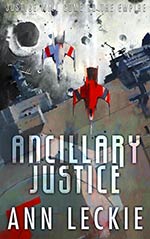
![]() BigEnk
BigEnk
11/21/2024
![]()
Set thousands of years in the future of humanity, Ancillary Justice follows Breq, an AI that uses human bodies(or ancillaries) as a means of interacting with the world. Breq used to be a part of, an individual amongst, their greater AI hivemind self that served as the AI for an entire ship's worth of ancillaries as well as the ship itself. The existence and use of ancillary AI is a huge moral debate, even though they are used to colonize worlds for the human empire known as the Radch. The book follows multiple narrative threads as we learn Breq's history and the political climate that precipitates Breq being separated into an individual.
Having multiple narrative threads is a risky decision, one that plays out here to mixed success. It feels to me that it's risky because the writer has to make both narratives equally engaging, otherwise the reader wants to skip chapters that are weaker to get back to the good stuff. This happened to me a lot in A Song Of Ice and Fire with Bran's chapters. In Ancillary Justice these threads flip flop back and forth from being engaging and being filler. And yet I found that the beginning of the book with these two narratives was the better half, as you slowly unravel the mystery of the main character and their circumstances. That mystery kept me coming back for more, but after that veil had mostly been lifted I struggle to maintain my interest as much. I also had a problem with the ending of the book. It's written in a way that implies that you need to read the next book in the series. There's no satisfying conclusion to the story, but instead a mild cliff hanger that begs you to continue. I want to read sequels because I loved the first book so much that I need more, more of the story, the world, the characters, not because I'm chasing the conclusion that the first book deserved. I don't like how much contemporary SF is written this way.
Three stylistic choice revolving around the AI/human protagonist dominate the texture of the work: the use of she/her pronouns and an inability to determine gender(because of the race they belong to), the scattershot jumping between many perspectives as the AI sees from multiple bodies(which is really only a factor towards the beginning of the novel), and the cold detached perspective language that they use.
I see a lot of talk online about the pronoun usage being a major detraction from the work. I really couldn't disagree more. The pronoun usage is one of many cultural world building elements that are strong throughout the book. These include an obsession with tea and tea ceremony, a fixation on proper clothing, specifically gloves and ornamented jewelry, a complex theology that is a combination of all of the cultures that the Radch has "annexed", and a caste system that is embedded into government and military structures. I can see how initially only using the pronoun she/her could be confusing and muddle the character building. But honestly, it's not that big of a deal. Who cares if you don't 100% know the gender of all the characters? That doesn't change who they are. As the novel progressed this style faded into the background, barely noticeable at all. I think these culture building quirks are a strong point of the entire novel. They fit well into the foreground of a larger world that is interesting and detailed. I enjoyed the political space opera elements.
Another major strength of the work lies though in the ideas around AI, and the splitting of a personality/mind, either into symbiotic individuals, or into adversaries that are still somehow part of the same whole. It's a really cool idea that I haven't yet seen explored in SF, though I'm sure it has. Even if so, the exploration of the idea was excellent and thorough. There were several reveals relating to these ideas that were very exciting. I just love how Leckie explores identity and a mind that is at odds with itself.
That all being said, the final of those textural elements severely limited my enjoyment of otherwise excellent world building and ideas. I don't know if the cold and indifferent language that the novel is written in was Leckie's choice to portray the perspective of a character that struggles with their emotions, someone who is coming to terms with their individuality. Regardless of if this is the case, I think it undercut everything else she was trying to do. The writing itself is boring, non-descriptive and unimaginative. I can't tell you how many times the world "gesture" was used to describe a characters reaction to something. I was begging her to be more descriptive, to paint a picture just a little bit. This is a stunning world, but a world that only exists within the confines of some pages in black and white, it does not leap out of the book and surround you. I also struggled to suspend my disbelief over some of the enormous coincidences that the plot rested on.
Ancillary Justice has some amazing qualities, but also some critical flaws that prevents it from being amazing as a whole. I also struggle to find the initiative to read more in the series, because I know that the second book will have a similar ending leading to the third.